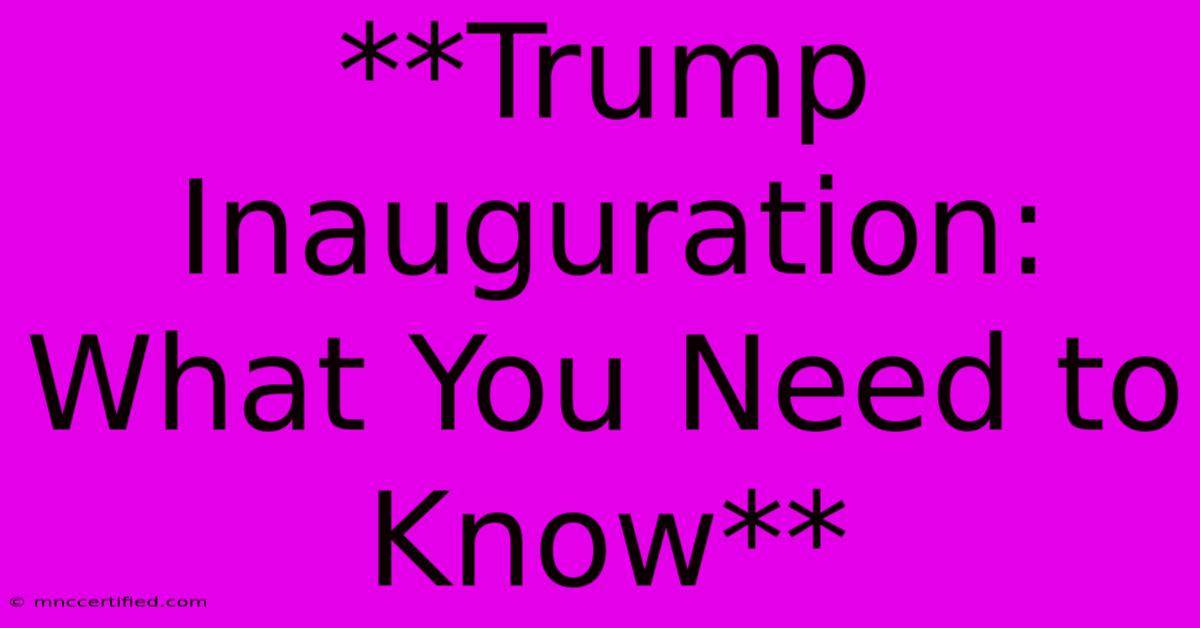**Trump Inauguration: What You Need To Know**

Table of Contents
Trump Inauguration: What You Need to Know
The inauguration of Donald Trump as the 45th President of the United States was a historic event, marked by both celebration and controversy. Held on January 20, 2017, the ceremony saw Trump take the oath of office and deliver his inaugural address.
This article will delve into the key aspects of the Trump inauguration, providing you with a comprehensive understanding of this pivotal moment in American history.
The Ceremony and the Address
The inauguration ceremony took place at the US Capitol Building in Washington, D.C. It featured a traditional format, including:
- The swearing-in ceremony: Chief Justice John Roberts administered the oath of office to Trump, marking the official transition of power.
- The inaugural address: Trump delivered a speech outlining his vision for the country, emphasizing themes of American nationalism, economic revival, and national security. His address was met with both cheers and boos from the crowd.
The Crowd and the Protests
Estimates of the crowd size at the Trump inauguration have been highly debated. Some sources claim it was the largest inauguration audience in history, while others argue it was smaller than previous inaugurations.
The event also saw significant protests, both in Washington, D.C., and across the country. Demonstrations against Trump's policies and rhetoric drew large crowds, highlighting the deep divisions present in American society.
Key Moments and Controversies
The Trump inauguration was not without its controversial moments. Some of the most notable include:
- The performance of the Mormon Tabernacle Choir: The choir's participation drew criticism from some, who argued it was inappropriate for a religious organization to perform at a secular event.
- The attendance of controversial figures: Several figures with controversial pasts attended the inauguration, including former Ku Klux Klan Grand Wizard David Duke. Their presence sparked outrage and criticism.
- The use of the phrase "American carnage": Trump's use of this phrase in his inaugural address was seen by some as divisive and inflammatory.
The Aftermath
The Trump inauguration marked the beginning of a turbulent four years in American politics. Trump's presidency was characterized by controversy, division, and significant policy changes. The inauguration itself remains a point of contention and a symbol of the deep political divisions that continue to shape American society.
Understanding the Significance
The Trump inauguration was a landmark event that continues to resonate with Americans today. It serves as a reminder of the complexities of American politics, the power of rhetoric, and the enduring divisions within the country. By understanding the events surrounding the inauguration, we can gain a deeper appreciation of the political climate that has shaped the United States in recent years.
Key Takeaways:
- The Trump inauguration was a highly anticipated event, marked by both celebration and controversy.
- Trump's inaugural address set the tone for his presidency, focusing on themes of American nationalism, economic revival, and national security.
- The event also saw significant protests, reflecting the deep divisions present in American society.
- The Trump inauguration was a turning point in American politics, marking the beginning of a period of significant change and upheaval.
This article has provided a comprehensive overview of the Trump inauguration, covering its key events, controversies, and lasting significance. It is important to continue to engage with this event and its context to better understand the complexities of American politics and the ongoing challenges facing the nation.

Thank you for visiting our website wich cover about **Trump Inauguration: What You Need To Know**. We hope the information provided has been useful to you. Feel free to contact us if you have any questions or need further assistance. See you next time and dont miss to bookmark.
Featured Posts
-
Money Wealth Life Insurance Jake Thompson
Nov 07, 2024
-
Jack Smith Plans Trump Case Wind Down
Nov 07, 2024
-
Live Score Crvena Zvezda Vs Fc Barcelona Champions League
Nov 07, 2024
-
Farkes Xi Norwich Vs Millwall Lineup
Nov 07, 2024
-
Optometry Professional Liability Insurance
Nov 07, 2024